Physical Address
304 North Cardinal St.
Dorchester Center, MA 02124
Physical Address
304 North Cardinal St.
Dorchester Center, MA 02124

Pregnancy doesn't mean skipping camping trips—discover essential safety tips and comfort hacks that make outdoor adventures possible for expecting mothers.
You’ve probably heard that pregnancy means putting outdoor adventures on hold, but that’s not necessarily true. With the right preparation and precautions, you can still enjoy camping while expecting—though it’ll look quite different from your pre-pregnancy trips. The key lies in adapting your approach to prioritize safety and comfort without sacrificing the experience entirely. Before you pack that tent, there are specific strategies that’ll make the difference between a memorable getaway and a stressful ordeal.
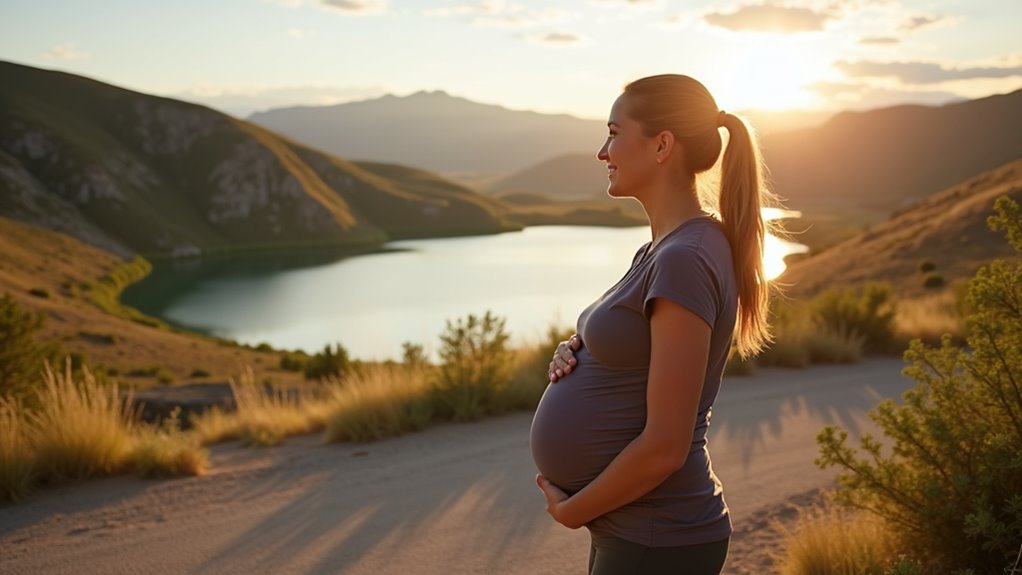
When you’re expecting, selecting the right campsite becomes more critical than ever since your comfort and safety needs have substantially changed.
Look for established campgrounds with clean restroom facilities nearby – you’ll appreciate not having to trek far for frequent bathroom breaks.
Choose level ground to prevent rolling off your sleeping pad and ensure easier movement around your campsite.
Avoid remote locations where medical help isn’t readily accessible.
Opt for sites with potable water sources to stay properly hydrated without relying solely on what you’ve packed.
Consider campgrounds with cell phone coverage for emergencies.
Skip high-altitude locations above 8,000 feet, as reduced oxygen levels can affect both you and your baby.
Prioritize comfort over adventure during this special time.
Research online retailers and forums for discount camping gear to help you acquire pregnancy-friendly equipment without breaking your budget.
Since your body’s changing needs require extra support and preparation, you’ll want to pack specialized gear that prioritizes comfort and addresses pregnancy-specific challenges. Bring a high-quality sleeping pad or air mattress for better back support and cushioning. Pack multiple pillows, including a pregnancy pillow for proper spinal alignment. Don’t forget compression socks to improve circulation and reduce swelling during long sitting periods.
Include an all-encompassing first-aid kit with prenatal vitamins, antacids, and any prescribed medications. Make sure your first aid kit contains essential items specifically needed for camping emergencies. Pack extra water bottles and electrolyte supplements to maintain proper hydration. Bring comfortable, loose-fitting clothes in layers, plus waterproof gear for unexpected weather changes.
Consider portable seating like a supportive camping chair that’s easy to get in and out of, reducing strain on your joints and back.
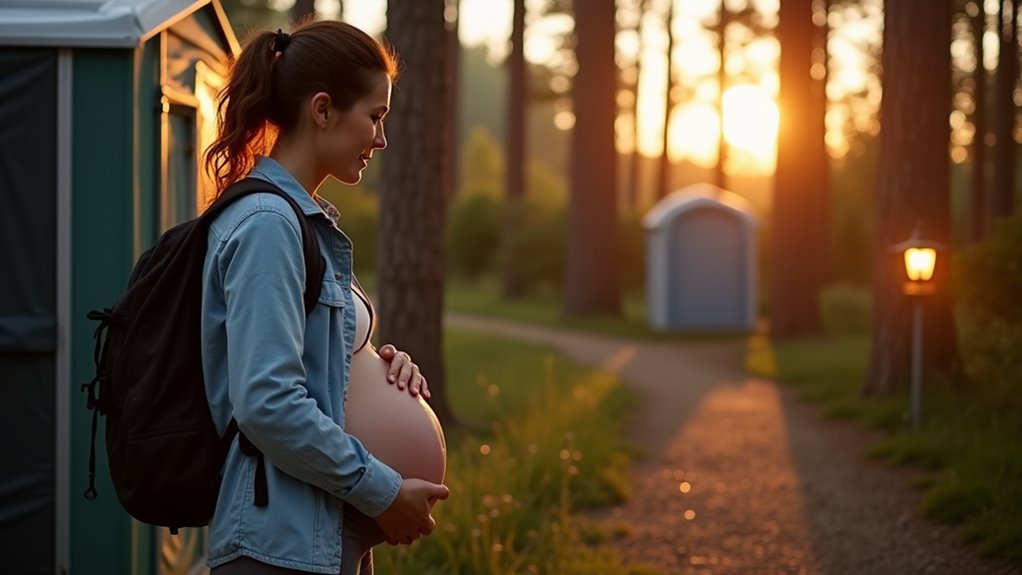
During pregnancy, your bladder capacity decreases while the frequency of bathroom needs increases markedly, making restroom accessibility a crucial factor in campsite selection. Choose campsites within walking distance of clean facilities, ideally no more than a two-minute walk from your tent.
Pack a portable camping toilet or bedpan for nighttime emergencies when trekking to distant bathrooms isn’t practical. Bring a flashlight and comfortable slippers for safe midnight trips.
Consider reserving sites near bathhouses at developed campgrounds rather than primitive locations. Stock up on toilet paper, wet wipes, and hand sanitizer since facilities may run low on supplies.
Map out bathroom locations immediately upon arrival, and don’t hesitate to ask campground staff about the cleanest, closest options available.
Morning sickness can strike at any time of day while camping, so you’ll need strategic meal planning and rock-solid food safety practices to keep both you and your baby healthy in the outdoors.
Pack bland, easily digestible foods like crackers, toast, and ginger tea to combat nausea. Keep snacks accessible in your tent for quick relief.
Store perishables in a well-insulated cooler with plenty of ice, maintaining temperatures below 40°F. Use separate cutting boards for raw meat and other foods to prevent cross-contamination.
Cook all meats thoroughly – invest in a reliable meat thermometer. Wash your hands frequently, especially before handling food.
Don’t let prepared foods sit out longer than two hours in temperatures above 90°F. When in doubt about food safety, throw it out rather than risk foodborne illness.
Consider that family camping creates lasting memories and bonding experiences that can make the extra preparation and precautions worthwhile for expecting mothers.
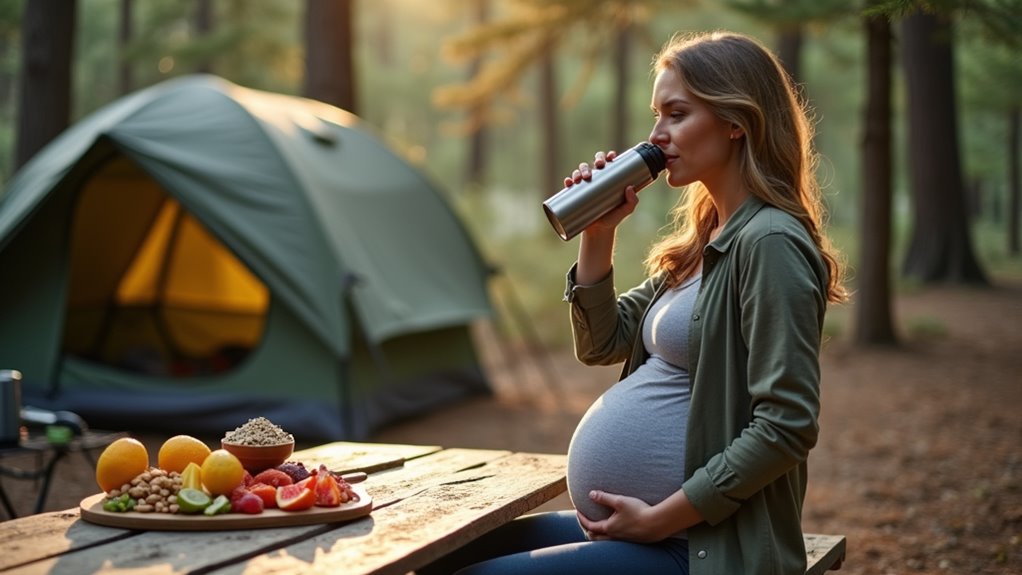
When you’re pregnant and camping, your body needs markedly more water and nutrients than usual to support both you and your developing baby. Pack extra water bottles and aim for at least 10-12 glasses daily, especially in hot weather or at high altitudes. Bring electrolyte supplements to replace minerals lost through sweating.
Plan protein-rich snacks like nuts, cheese sticks, and hard-boiled eggs to maintain steady energy levels. Pack whole grain crackers, dried fruits, and yogurt for quick nutrition boosts. Don’t skip meals—eating smaller, frequent portions prevents blood sugar drops that can worsen pregnancy fatigue.
Store perishables in a well-insulated cooler with plenty of ice. Check food temperatures regularly and discard anything that’s been in the danger zone too long. Remember that heat exhaustion poses additional risks during pregnancy, making proper hydration and nutrition even more critical for your safety.
Getting quality sleep while pregnant and camping requires strategic modifications to your typical outdoor sleeping arrangement. Your growing belly and changing body need extra support, so don’t rely on your standard camping gear.
Key adjustments you’ll want to make:
Consider upgrading to a larger tent that accommodates your movement needs and allows comfortable position changes throughout the night. When packing your sleep essentials, prioritize compact camping gear that maximizes comfort while fitting efficiently in your vehicle’s limited space.
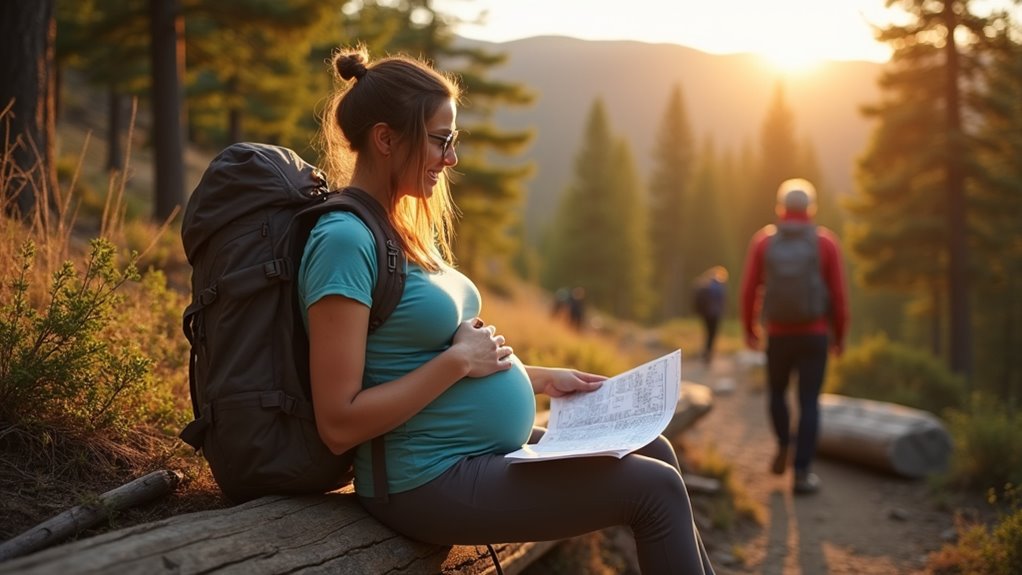
Your comfort during sleep sets the foundation for how you’ll feel during daytime activities, but pregnancy brings new physical boundaries that you can’t ignore while camping. Skip strenuous hikes and opt for gentle nature walks instead. Avoid activities requiring balance like rock climbing or maneuvering through uneven terrain, especially as your center of gravity shifts.
Don’t lift heavy camping gear—ask your partner to handle setup and breakdown tasks. Take frequent breaks and listen to your body’s signals. If you feel dizzy, short of breath, or experience any pain, stop immediately and rest.
Stay within easy walking distance of your campsite and avoid remote locations where medical help isn’t readily accessible. Your safety trumps adventure every time. Consider destinations like Alpine, Wyoming where you can choose between more adventurous camping or relaxing options depending on how you’re feeling during your pregnancy.
Since pregnancy affects your body’s ability to regulate temperature, you’ll need extra protection against weather fluctuations that could make you uncomfortable or unsafe.
Pregnancy heightens temperature sensitivity, making proper weather protection essential for your comfort and safety during outdoor activities.
Pack layers you can easily add or remove as your body temperature shifts throughout the day. Your increased blood volume and hormonal changes make you more sensitive to both heat and cold extremes.
Essential weather preparation includes:
Check weather forecasts hourly and have backup shelter plans ready. If you’re planning to camp in mountainous regions, the Andes adventure experience shows how quickly weather conditions can change at higher elevations, making temperature preparation even more critical.
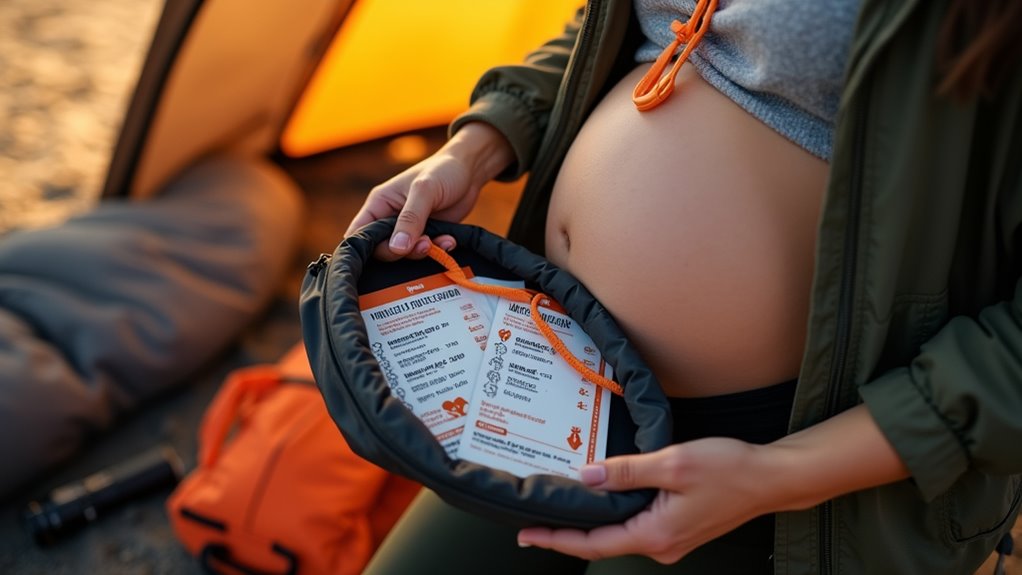
Although cell service can be spotty in remote camping areas, you’ll need reliable access to critical medical information and emergency contacts throughout your trip. Create a physical backup of essential information including your doctor’s contact details, insurance information, and any pregnancy-related medical conditions or medications. Store copies in multiple locations like your purse, car glove compartment, and with your camping partner.
Consider investing in a satellite communicator or emergency beacon for areas with no cell coverage. Download offline maps and identify the nearest hospitals before departing. Share your itinerary with trusted contacts who aren’t camping with you.
Keep your phone charged using portable power banks, and pack a car charger as backup. Just as you’d research whether renting or buying is best for a boat before a water-based adventure, carefully evaluate your communication needs and backup options for your camping location. These precautions guarantee you’re prepared for any pregnancy-related emergencies.
While camping during pregnancy can be incredibly rewarding, certain warning signs demand immediate attention and may require you to pack up and head home early. Don’t ignore your body’s signals – your safety and your baby’s health come first.
Watch for these red flags that signal it’s time to leave:
Trust your instincts completely. If something feels wrong, it probably is. You’re not being dramatic by cutting your trip short – you’re being responsible.
Pack efficiently, notify your healthcare provider, and head to familiar territory where medical care is readily accessible. Remember that safe outdoor camping requires extra vigilance during pregnancy, so always prioritize your wellbeing over completing your planned itinerary.
You’ve mastered the art of outdoor glamping disguised as “camping” – complete with your fortress of pillows, emergency snack arsenal, and bathroom GPS coordinates. Sure, you’re not exactly roughing it like a wilderness survivalist, but who needs to commune with nature when you can commune with modern conveniences instead? Embrace your pampered camping style; there’s no shame in prioritizing comfort over conquering the great outdoors. Your bladder won’t judge you.